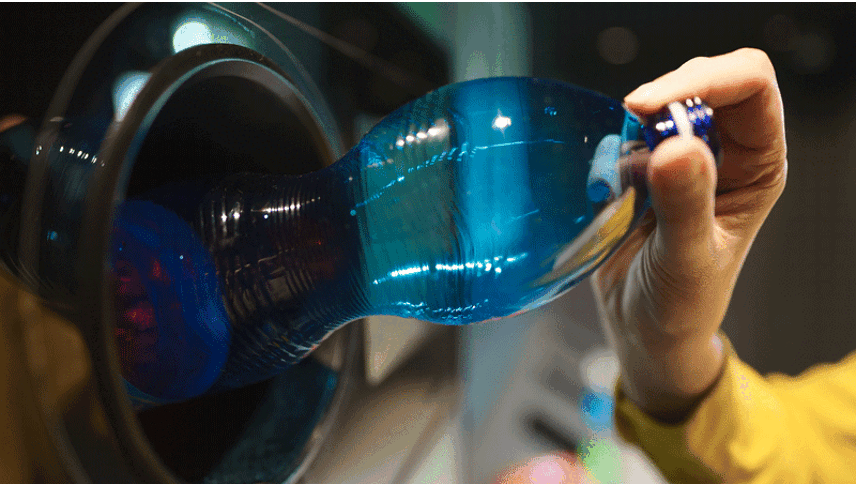Register for free and continue reading
Join our growing army of changemakers and get unlimited access to our premium content

Pictured: A reverse vending machine for plastic bottles, stock image
Speaking at Holyrood this afternoon (18 April), Yousaf said: “A number of business organisations have expressed concern, in recent months, about the balance that the Scottish Government has been striking. In fact, they have called for a reset of the relationship between business and Government. And I’m happy to start that reset today.
“I remain committed to the [DRS] as a way to increase recycling, to reduce litter on our streets and our beaches, and to help achieve our net-zero ambitions. But we recongise the uncertainty that continues to be created as a result, of course, of the UK Government delaying [its] decision to exclude the Scheme from the Internal Market Act. Now, we had hoped for a decision this week, but it has not come.
“At the same time, myself and the Circular Economy Minister [Lorna Slater] have heard the concerns of businesses, particularly about the readiness of the scheme for launch this August. As a result, we will now delay the launch of the scheme until 1 March 2024.”
Slater stated in February that she was opposed to any further delay to the DRS.
Scotland has been preparing to launch a DRS for several years now. Pre-pandemic, it had intended to launch such a scheme by 2021.
DRSs see customers paying a set, refundable deposit for every package of drink they purchase. They receive this money back when depositing the package for recycling or reuse through an official channel, such as in-store or to a dedicated reverse vending machine. Such schemes are already operational in nations including Germany, Finland and Norway.
There are two kinds of DRS – ‘all in’ and ‘on-the-go’. On-the-go schemes cover only packaging of certain sizes and materials, with a focus on beverages consumed outside of the home, given that these containers are the most frequently littered. All in schemes cover a wider range of sizes and packaging materials.
Scotland’s DRS, in its current form, is all in, and sets the deposit rate at 20p per container. Westminster is pushing for a less all-encompassing scheme in other parts of the UK, notably excluding glass from its own proposals.
Yousaf acknowledged that many businesses, particularly SMEs, were looking for more time for the Government to “simplify and de-risk the [Scottish] scheme”.
Business reaction, public opinion
Trade bodies including Hospitality Scotland, the Society of Independent Brewers and the Night Time Industries Association had been calling for the scheme to be delayed to enable major reform. The main arguments were that businesses were not prepared and that the scheme will add extra costs for consumers.
While these groups are welcoming the delay, others have expressed disappointment. The British Soft Drinks Association’s director-general Gavin Partington said: “Our members have committed to the introduction of a DRS and have spent several years and millions of pounds on its planned launch in Scotland.
“Further delay now leaves the scheme in a precarious position and we will be looking to the Scottish Government to protect the considerable industry investment to date.”
Scottish countryside charity APRS called the delay “a bitter betrayal of Scotland’s natural environment”.
A Plastic Planet’s co-founder Sian Sutherland called the delay “disappointing to say the least”. She said: By the time we actually introduce DRS in UK at large, brands and retailers will have leapfrogged to even simpler systems of pre-filled reusable standardised packaging. Has DRS missed its original boat?”
City to Sea’s policy manager Steve Hynd made a similar point to Sutherland. He said: ““This disappointing delay in Scotland is also a perfect opportunity for Westminster. They could, right now, pledge to match Scottish levels of ambition in accepting glass – as their own consultation encouraged them to – and to match the new Scottish timetable.”
The Scottish Conservative & Unionist party has described the DRS as “hated”.
Ipsos Scotland polling conducted in March found that 49% of the general public support the scheme while 31% were opposed. The majority (88%) of people said they would use the scheme at least occasionally.
There was a clear split in support along party lines – 63% of those who voted SNP in 2021 supported the DRS, compared with 38% of Labour voters and 25% of Conservative voters


“Such schemes are already operational in nations including Germany, Finland and Norway”
Germany has always had deposits on many types of glass bottles and introduced material wide deposits over 30 years ago.
It was common in the UK up to 50 years ago.
It is simple scheme, delivers everything that is hoped for.
“Westminster is pushing for a less all-encompassing scheme in other parts of the UK, notably excluding glass from its own proposals.”
This is what we expect from the UK, it will water down the major aspects of the scheme to appease “industry” to the point where it delivers little of the potential benefits, overcomplicates things to accommodate industry and maintain the status quo. This approach will achieve little.